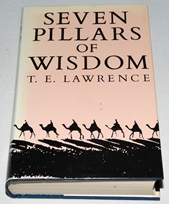Review of 'Seven Pillars of Wisdom'
Seven Pillars of Wisdom by T. E. Lawrence
 This is the autobiographical story of T. E. Lawrence's (“Lawrence of Arabia”) involvement in the Arab revolt of 1916-1918. As a member of the British Forces he was tasked with gaining the trust of the Arab forces which could then be exploited in furthering British military objectives in the region. Lawrence came to appreciate the Arab people and the leader of their consolidated forces “Faisal I bin Al-Hussein bin Ali Al-Hashemi” (or “Faisal” here). He led various campaigns to disrupt the transport systems of their Turkish enemy by destroying train lines and bridges.
This is the autobiographical story of T. E. Lawrence's (“Lawrence of Arabia”) involvement in the Arab revolt of 1916-1918. As a member of the British Forces he was tasked with gaining the trust of the Arab forces which could then be exploited in furthering British military objectives in the region. Lawrence came to appreciate the Arab people and the leader of their consolidated forces “Faisal I bin Al-Hussein bin Ali Al-Hashemi” (or “Faisal” here). He led various campaigns to disrupt the transport systems of their Turkish enemy by destroying train lines and bridges.
In adopting the ways of the Arab people Lawrence earned their respect while feeling more and more guilty of his betrayal to their cause “…a home-sickness came over me, stressing vividly outcast life amount these Arabs, while I exploited their highest ideals and made their love of freedom one more tool to help England win.” This is very much a book of the times with outright prejudice and exploitation of the native people by the armies of the allied forces and the “first world”. I have to say I very much cringed at the language most explicitly used in the introduction to the book.
I am very much a fan of the film Lawrence of Arabia despite it's rather long running length. I very much appreciated the incredible cinematography and the bigger-than-life character of T. E. Lawrence played with incredible conviction by Peter O'Toole. This book is quite a contrast with the drama of the film with the focus being more on the mundane and matter-of-factness of Lawrence's reporting of what was going on around him. Incredibly some of the more powerful sequences in the film such as his rape by a local official and the mass slaughter of retreating enemy are here pretty much as they appear in the film but simply reported with no analysis. Indeed, the rape is reported in one chapter with the next continuing on as if nothing had happened.
I have to say I found it impossible to follow all the people and places mentioned in this book preferring instead to read carefully and take in the sentiment and general narrative flow. In this way I under no illusion I missed much of importance here but it was really the only way to make it through. Make it through I did though, taking a few months for the 530+ pages, barely reading a chapter a night due to the richness of both the prose and detail of the events. Often Lawrence will stop the narrative for a chapter or so to elucidate on some philosophical thread that has no effect on the single-mindedness of his duplicitousness and his, and the Arab people's objective of seizing Damascus from the Turks. There are several maps in the book which are hard to make out and in which, despite my best efforts, I was never really able to use to find many of the locations Lawrence mentions other than the most obvious (Akaba, notably).
Despite being very well written and doubtless of interest to scholars, I never learned to have any sympathy for Lawrence in his cold, calculating manner towards the Arabs despite feigning friendship with them. I found “Seven Pillars of Wisdom” (referring to seven major cities in the region) difficult to read though I am happy to have done so and learnt perhaps a bit more about the events of Arab revolt and the man known as Lawrence of Arabia.
Rating: “Average, but who wants to be average?”
Review Date: 2023-12-26
Genre: Autobiography
Publisher: Guild Publishing London
Publication Date: 1926